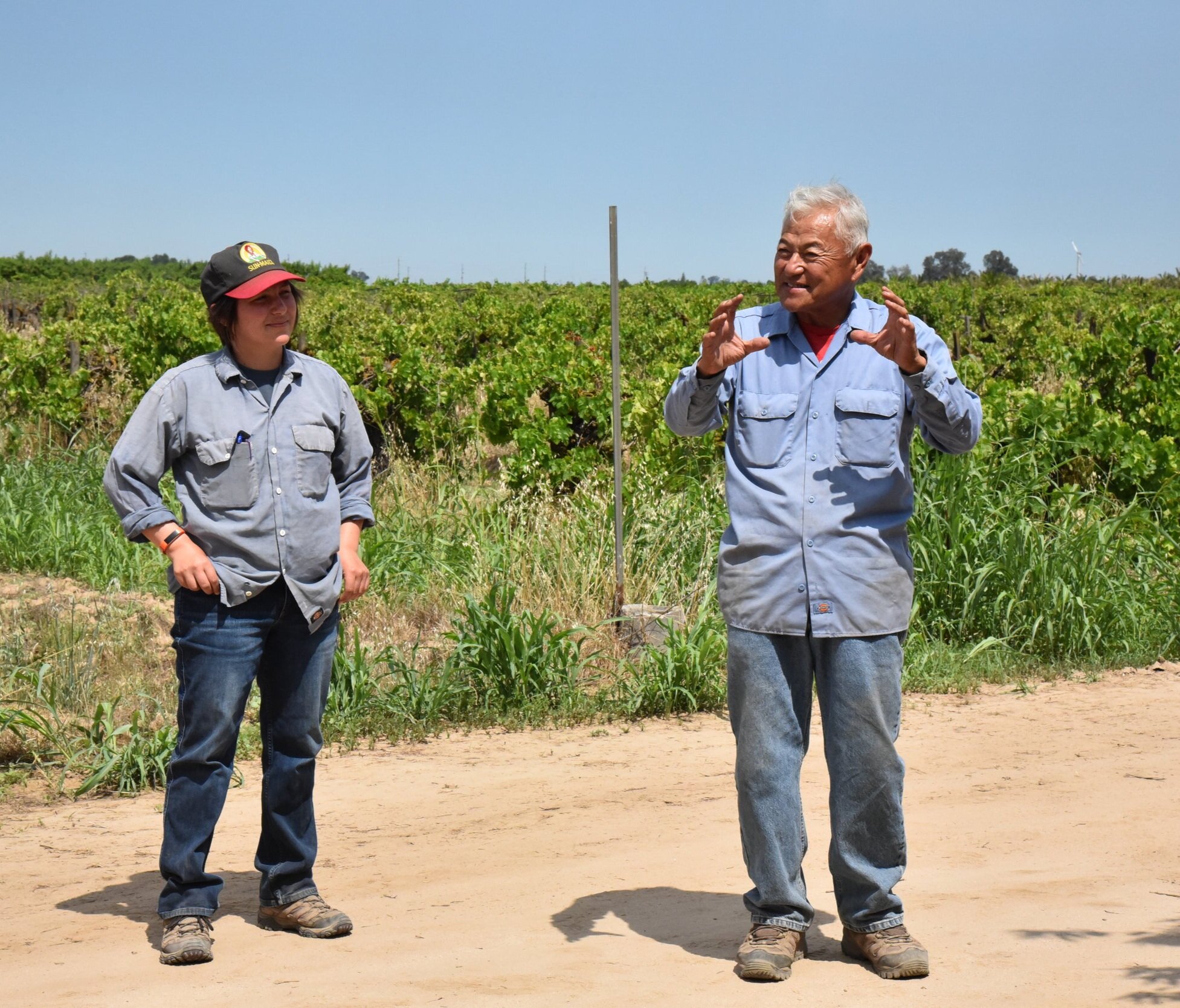More Than Stone Fruit, Masumoto Family Farm Hopes to Expand Eaters’ Relationship with Food
“I hope my answers aren’t too esoteric,” Nikiko Masumoto laughed during a recent phone call with OGC. The chance to chat with Nikiko is always more than just a moment to touch base about the upcoming harvest, or what’s new and exciting happening around the farm. Instead, it’s an opportunity to speak with someone working to redefine relationships with food and the planet.
“Everyone who works to get food from a farm to a person is part of what our family thinks of as the sacred relationship between earth and body,” Nikiko shares.
Nikiko & David Mas Masumoto, OGC‘s 2019 Stone Fruit Tour
This philosophy helps guide their decisions as farmers, storytellers, and community members. The transition from conventional to organic, which Nikiko’s father David Mas Masumoto implemented, is just one component of how they measure their impact.
“The Masumotos are unrivaled in the way they position themselves as growers. Their thoughtfulness and sense of responsibility help drive progressive conversations about continuous improvement,” shares OGC stone fruit Buyer Brian Keogh.
In the pursuit of growing and harvesting impeccable stone fruit, the Masumotos have evolved their planting strategy to include smaller blocks, allowing for more precise tree maintenance. This precision, paired with their selection of varieties that prioritize flavor over size, in many ways makes for more work for their small team.
Not only more physical labor and coordination to plant, tend and harvest their fruit, but also a product that challenges what Nikiko refers to as people’s implicit food bias. Of their fruit, Nikiko expressed a desire to use it as a medium to impact the way eaters think of what makes a “good” product and how they consider seasonality.
Nikiko notes that the behaviors of many shoppers have shifted in what many believe to be the right direction of more seasonal eating. To those eaters who choose only to purchase stone fruit when the season is on in their region, she’d like to challenge them to take a step further, adding even more nuance to their thinking.
“We are constantly encouraging people to experiment with their own embodied knowledge of the ripeness of fruit,” Nikiko says. “As an eater, if you encounter a peach that’s a little on the firmer side, you can take the time to let it soften. But, there’s also an opportunity with slightly underripe or overripe fruit to explore a different eating experience.”
She goes on to explain that the concept of eating at every stage within a season isn’t only a sustainable way to help reduce food waste; it’s also an exploration of an intuitive relationship with food. Understanding the unexpected flavor and textural traits of food that fall outside of “perfect” or “peak,” she feels is not only important but joyful.
Her challenge, as a grower, is finding ways to share a message that often gets lost in the food supply chain.
Though their role in the market presents challenges to attaining this goal, the family is doing their part to reduce food waste and strengthen shoppers' relationship with the planet in other ways.
Eight years ago, the farm created a program they call the “Ugly Fruit Drive-Thru,” where twice a week, they invite folks to come to the farm and purchase “OUFAB” fruit (Organic Ugly and Fabulous.) Originally popular with locals, Nikiko shares that the program has been so successful that people have started traveling from as far as the Bay Area to purchase cases of their seconds.
In 2020, the Masumotos saw an opportunity to provide their community with a little healing while they dealt with the heaviness and isolation brought on by the pandemic. The farm hosted zero-contact, self-led walking tours inspired by the Japanese tradition of forest bathing. Hosted during the spring, while their orchards were heavy with blossoms, the Masumotos created the Blossom Bathing program.
The experience asked its visitors to consider the natural elements around them and to meditate on the feeling of being present in time and space.
Those blossoms have now developed into the well-loved peaches that Masumoto Family Farm is known for, and the first harvests of early varieties have begun. Enjoy fruit from this grower all season.
---
To hear more from Nikiko Masumoto check out her 2015 Ted Talk which explores their family’s history and more about her relationship with growing and sharing food.


